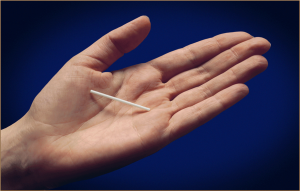Implanon Side Effects
Serious Side Effects of Implanon
- tenderness, inflammation, redness or discharge from the location of the implant
- feeling numb or losing strength (particularly loss of feeling, or weakness on one side of the body)
- persistent coughing or wheezing which may consist of blood
- strong pain, aching or cramping of the pelvis (lower part of the abdomen)
- quickened breathing and chest pain or tension that may spread to the shoulder area, feeling nauseous, increased sweating, and a general ill feeling
- difficulty seeing or speaking, a painful feeling behind the eyes, confusion and trouble balancing
- extreme high blood pressure which may produce side effects of a strong headache, blurry vision, hearing a slight buzzing in the ears, trouble breathing, feeling short of breath, irregular heart rate, feeling anxious, and having a seizure
- swelling of the breasts or development of a lump in the breast
- enlargement, warmth and redenning of one leg or both legs, inflammation of the hands, ankles or feet
- yellowing of the eyes or skin (jaundice)
- depression: insomnia or trouble sleeping, feeling weak, fatigue, and having frequent mood swings)
- serious allergic reaction: rash, redness, hives, difficulty breathing, hoarseness and swelling of the throat, tongue, mouth, or lips
Common Side Effects of Implanon
- changes in menstruation (varied bleeding, time or duration of periods), increased cramping, discharge from the vagina or itchiness
- upset stomach and nauseousness
- aching of the breasts
- increase in weight
- more frequent breakouts or acne
- flu-like symptoms- fever, chills and soreness of the throat
- trouble wearing contact lenses

- minor back pain
- nervousness, mild depression, feeling dizzy or having frequent changes in mood
- reactions at the site of the implantation: pain, numb or tingly feelings at the location of the implant, a slight bleeding or small scar
Warnings & Recalls for Implanon
Implanon and Pregnancy
Implanon
should not be used by anyone who is pregnant or trying to become pregnant. Patients will need to take a pregnancy test before receiving Implanon.
Do not use Implanon if you are currently breastfeeding a child that is under 4 weeks of age.
General Warnings
Implanon
is not for everyone, such as people who are
allergic to etenogestrel, persons who:
- have had a heart attack, stroke
- have a history of blood clots
- have ever had cancer that is hormone-related
- are currently having irregular bleeding from the vagina that is diagnosis
- disease of the liver or liver cancer
Tell your doctor about any
health conditions you may have to ensure that you may safely use Implanon. Be sure to
let your healthcare provider know if you have:
- diabetes, raised cholesterol or triglyceride levels or if you are above a healthy weight
- high blood pressure
- ever had depression
- any problems with your ovaries (such as an ovarian cyst)
- gallbladder disease or kidney disease
- frequent or persistent headaches
- ever had a reaction or if you have an allergy to medications for numbing
Patients who have received Implanon should have frequent mammograms.
Implanon Interactions
Patients who have an Implanon device implanted
should not smoke. Smoking while using Implanon may raise your risk for developing
blood clots or having a
stroke or
heart attack.
Implanon may also
interact with other medicines; tell your doctor about any drugs you are using, especially:
- any medicines for pulmonary arterial hypertension (high blood pressure in blood vessels)
- dexamethasone
- certain medications (such as griseofulvin) for treating infections of the skin including athletes foot or ringworm
- rifabutin, rifampin or rifapentine which may be used to treat tuberculosis or prevent the spread of certain diseases
- antifungals
- barbiturates (depressant medicines that induce sleepiness)
- treatments for hepatitis C, human immunodeficiency syndrome (HIVE), or acquired immune deficiency syndrome (AIDS)
- drugs that are used to relieve symptoms of narcolepsy
- St. John's wort
- anti-convulsants (medicines for preventing seizures)
Implanon Treatment and Use
Implanon | etonogestrel is a contraceptive implant marketed by Organon in the form of a rod that is inserted beneath the skin of the upper part of the arm. This product is used for preventing pregnancy and may be kept in place for as long as 3 full years.
How Does Implanon Work?
After being implanted into the upper arm, Implanon releases a steady amount of etonogestrel, a hormone that blocks the function of the ovaries and inhibits the an egg from being produced during ovulation. This hormone also accounts for a thickening of the cervical mucus as well as the lining as the uterus. These methods prevent sperm from fertilizing an egg or being able to survive by attaching to the uterus wall.
Implanon should be used only by women who are 18 or older.
How to Use Implanon
Patients must consult a doctor before receiving Implanon so that the implant may be given at a proper time (depending on if the patient is using another form of birth control). During procedure, the patient is given a local anesthetic and Implanon is put in place by a healthcare provider through a small needle into the upper arm (on the inner part of the arm located above the elbow joint).
After Implanon is inserted, the rod may be felt beneath the patients skin. If the device cannot be felt, the patient should notify their doctor at once. After 3 years, the implant must be removed, but may be replaced immediately.
Other Names for Implanon
Brand name: Implanon
Generic name: etonogestrel implant
Lawsuits & Legal Information for Implanon
